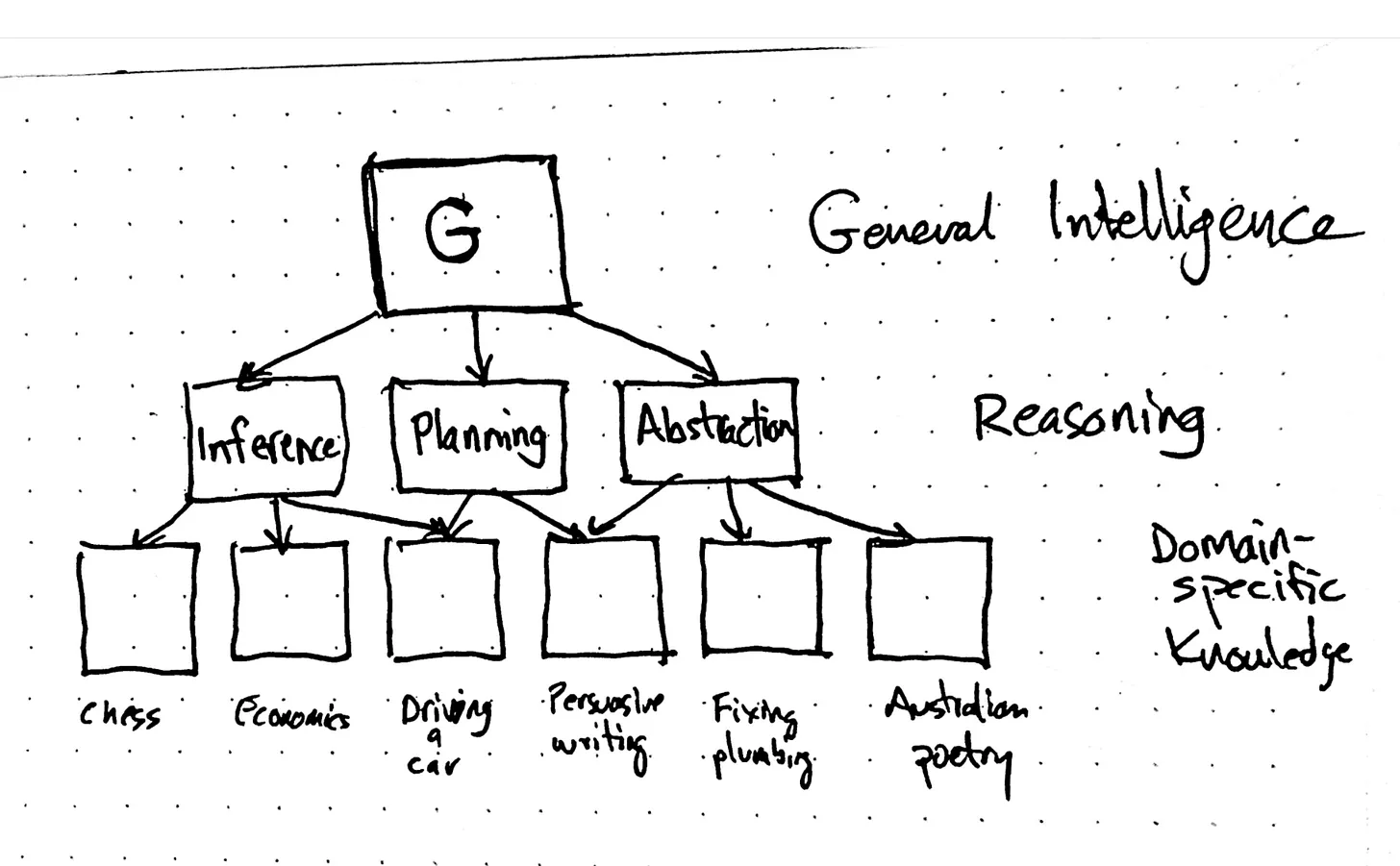Some Notes on Intelligence
Responding to Benjamin Riley, Modeling Minds (Human and Artificial): What are we talking about when we talk about intelligence? See also the discussion here.
In the paper on Modelling Minds Riley writes, " improving one’s
knowledge within a specific domain generally does not significantly
improve one’s reasoning abilities."
To the
extent that this is true (and it is probably not true) it is true only
in strictly limited circumstances. I would treat with a lot of
scepticism the De Bruyckere, Kirschner and Hulshof paper purporting to
make the case.
In the strictly limited case, the
principal amounts to this: if you only learn A, you only learn A, and
learning A will not help you learn B, even if both A and B involve some
higher level skill, C. So (for example) if you only learn physics, which
also involves learning mathematics, it will not help you learn
engineering, which also involves learning mathematics.
It's
hard to believe not learning mathematics while learning physics would
not also help you learn engineering. The only way to make the argument
work is to argue that, if you only learn physics, you do not actually
learn any mathematics at all. That is, in a nutshell, you cannot
generalize from a single instance, because (in principle) you don't know
what parts of physics generalize, and what parts of physics are
specific to physics.
But it is, in my view, a
bad argument (a terrible argument, actually) because as soon as you
start to learn engineering, you begin to recognize patterns that you
already saw in physics. You see that the exact same shapes and
operations are used (specifically, numbers and math functions). You
don't actually need some higher level principle in order to obtain this benefit, you just need to recognize the pattern.
That's
just as well, because the high level 'knowledge' stipulated by
De Bruyckere, Kirschner and Hulshof are effectively meaningless as
descriptions of any sort of knowledge. Here's what they are, in the
order presented in the paper:
- creativity (chess)
- problem solving (computer programming)
- executive functions (music)
- better thinking (languages)
The
authors go so far as to assert that these higher level 'skills' are
innate and not learned. For example, they write, "Creativity is not a
skill, and it cannot be taught or learned. Creativity is a quality or
characteristic that a person possesses."
The
diagram presented in the Riley article has a more plausible set of higher
order skills: inference, planning and abstraction in the first instance,
and the larger set of test-specific skills (above and below, center,
clean up, etc...) later on. But it's interesting to see that learning these
higher level skills is not impossible for LLMs, just difficult. As you
note, "On the other hand…the fact that LLMs can solve them at all is
impressive! Further, some might argue that in time we should expect them
to get better at this type of thing."
The more
solved examples of this sort you present to an LLM, the more nuanced
the pattern recognition becomes, and the more likely it will solve the
problem. Critically, it does not need to infer some higher level
principle at work in the examples (much less any of the completely
specious 'skills' described by De Bruyckere, Kirschner and Hulshof), it
just has to detect the pattern. And this is what LLMs, and neural nets
in general, are very good at.
Indeed,
what these examples will show in general is that the difference between
human and LLM performance (if, ultimately, there is any) will come down
not to some presupposed inability of LLMs to acquire some putative
'innate' skills, but rather, the body previous experience (in other
domains) that a human will have that an LLM won't. A human that has
taken other tests in other domains will recognize the conventions around
test-taking that an LLM will have to figure out for itself.
So
the proper test isn't when learning A also results in someone (or
something) learning C. The possibility that there even is a C won't be
recognized until attempting to learn B. And previous experience in other
domains will suggest that there is a possibility of being able to
recognize similarities between A and B. And that's why it's helpful to
teach mathematics as a separate subject. Not because of the content
knowledge acquired. But because it eases the learning of B after having
learned A by identifying aspects of C that might be relevant.
So
what is 'intelligence' on this alternative account? Well, it's not a
shopping list of 'higher order skills' - certainly not 'creativity,
problem solving, executive function and better thinking', not
'inference, planning and abstraction', and not even 'above and below,
center, clean up,
etc...'. No. On this view, knowledge is recognition, and intelligence is the capacity to recognize,
and this is most certainly something that can be learned or developed
in a person, and this represents a cultural difference, generally, and
not an inherent or genetic difference.



Comments
Post a Comment
Your comments will be moderated. Sorry, but it's not a nice world out there.